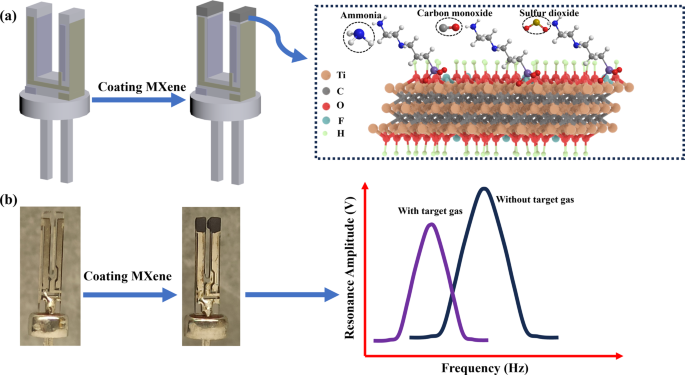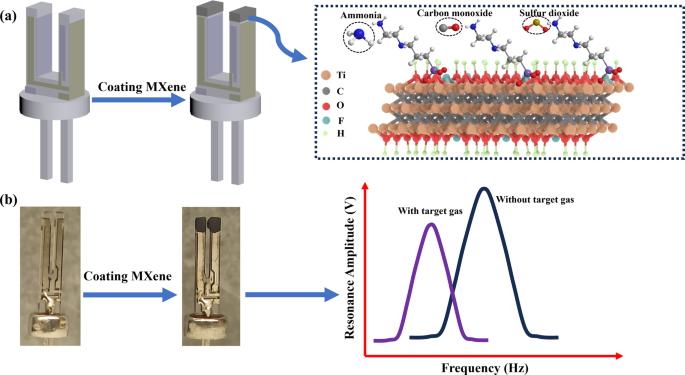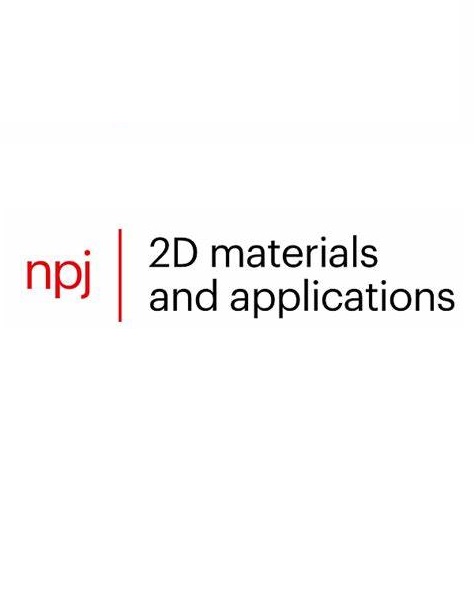Highly sensitive and reversible MXene-based micro quartz tuning fork gas sensors with tunable selectivity
IF 8.8
2区 材料科学
Q1 MATERIALS SCIENCE, MULTIDISCIPLINARY
引用次数: 0
Abstract
Due to their distinctive morphology, significant surface-to-volume ratio, and metal-like electrical conductivity, MXenes have emerged as highly promising gas-sensing materials. Traditional MXene-based gas sensors predominantly rely on the electrical conductivity of MXenes for signal transduction. However, it is crucial to explore alternative signal transduction mechanisms to fully unlock the potential of MXenes in gas sensing applications. In this study, we have successfully showcased the development of a mass-transduction-based MXene gas sensor, utilizing MXenes as the adaptable receptor and MQTF as the transducer. The interaction between the gas analyte and MXenes induces a change in mass, resulting in a resonant frequency shift of the MQTF. This signal transduction mechanism eliminates the dependency on the electrical conductivity of MXenes, offering a broader range of possibilities for chemical modification of MXenes without concerns about compromising their conductivity. By engineering Ti3C2Tx surfaces, we have demonstrated high sensitivity and selectivity tuning of MXene-MQTF gas sensors for detecting CO, SO2, and NH3. This antisymmetric mass-transduction-based (low-cost, stable, sensitive, and practical tuning fork-based) MXene gas sensor demonstrated exceptional sensing performance, customizable selectivity, and high cost-effectiveness. This study paves the way for designing high-performance MXene-based chemical sensors and expands the scope of potential applications in air quality monitoring, wearable devices, the Internet of Things (IoT), and robotics.


具有可调选择性的高灵敏度和可逆的基于 MXene 的微型石英音叉气体传感器
由于具有独特的形态、显著的表面体积比和类似金属的导电性,二氧化二烯类已成为极具潜力的气体传感材料。传统的基于二氧化二烯的气体传感器主要依靠二氧化二烯的导电性进行信号传导。然而,探索其他信号传导机制对于充分释放 MXenes 在气体传感应用中的潜力至关重要。在本研究中,我们成功展示了基于质量传导的二氧化二烯烃气体传感器的开发过程,该传感器利用二氧化二烯烃作为适应性受体,MQTF 作为传感器。气体分析物与 MXenes 之间的相互作用会引起质量变化,从而导致 MQTF 发生共振频率偏移。这种信号转导机制消除了对 MXenes 导电性的依赖,为 MXenes 的化学修饰提供了更广泛的可能性,而不必担心影响其导电性。通过对 Ti3C2Tx 表面进行工程设计,我们展示了用于检测 CO、SO2 和 NH3 的 MXene-MQTF 气体传感器的高灵敏度和选择性调节。这种基于质量转换的非对称(低成本、稳定、灵敏、实用的基于音叉的)MXene 气体传感器具有优异的传感性能、可定制的选择性和高成本效益。这项研究为设计基于 MXene 的高性能化学传感器铺平了道路,并扩大了其在空气质量监测、可穿戴设备、物联网 (IoT) 和机器人技术中的潜在应用范围。
本文章由计算机程序翻译,如有差异,请以英文原文为准。
求助全文
约1分钟内获得全文
求助全文
来源期刊

npj 2D Materials and Applications
Engineering-Mechanics of Materials
CiteScore
14.50
自引率
2.10%
发文量
80
审稿时长
15 weeks
期刊介绍:
npj 2D Materials and Applications publishes papers on the fundamental behavior, synthesis, properties and applications of existing and emerging 2D materials. By selecting papers with the potential for impact, the journal aims to facilitate the transfer of the research of 2D materials into wide-ranging applications.
 求助内容:
求助内容: 应助结果提醒方式:
应助结果提醒方式:


